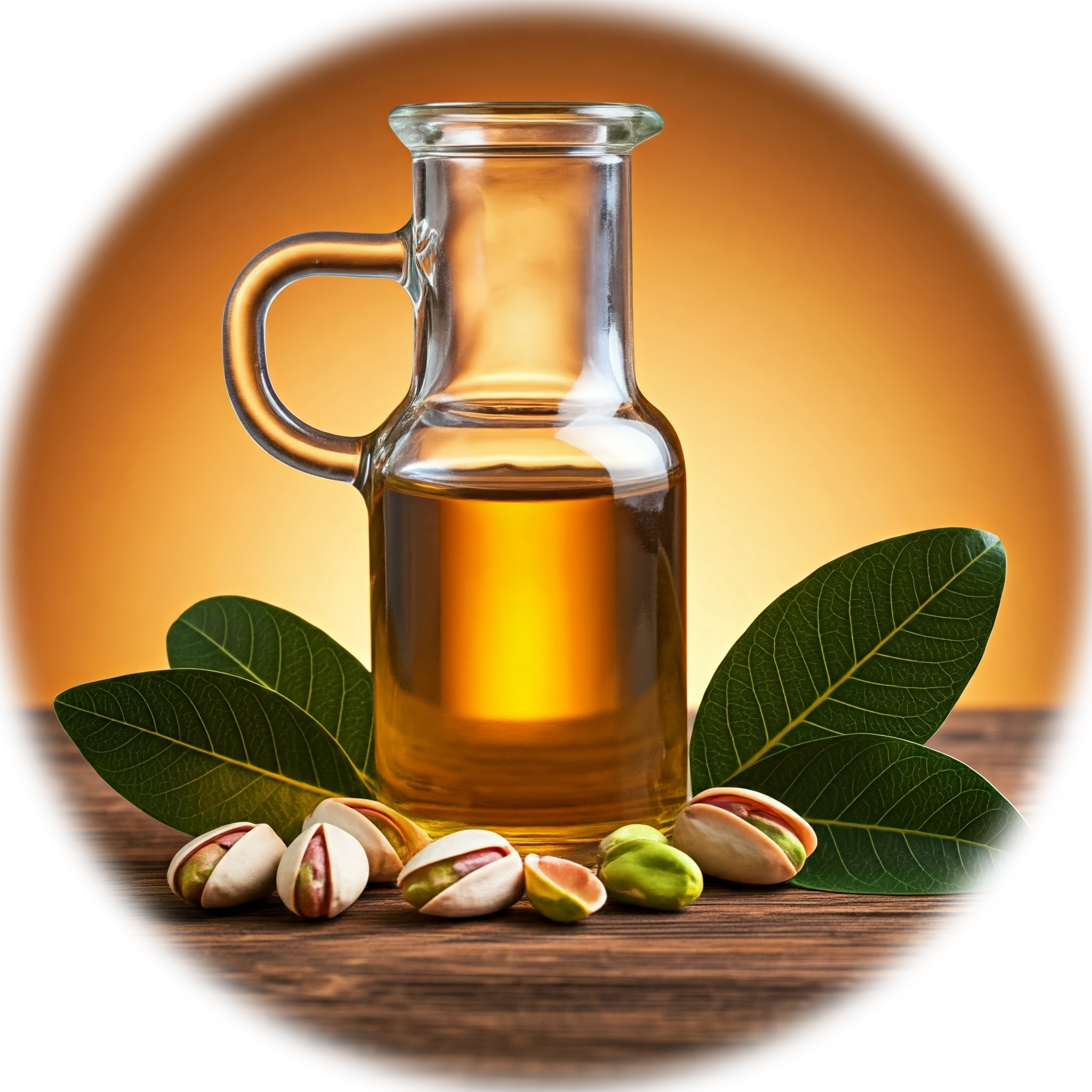
Nutritional properties of Pistachio Oil
Energy :
884.00 Kcal / 100g
Category : Oils and Fats
Group : Vegetable Oils & Fats
Composition And Nutritional Value :
Pistachio oil is a flavorful and nutrient-dense oil derived from pistachio nuts. It contains a variety of beneficial compounds, including:
Monounsaturated fats: Pistachio oil is rich in oleic acid, a heart-healthy fat that helps lower bad cholesterol (LDL) levels while increasing good cholesterol (HDL).
Vitamin E: This oil is a good source of vitamin E, which acts as an antioxidant, protecting cells from oxidative damage and supporting skin health.
Phytosterols: Plant-based compounds that may help lower cholesterol levels and improve heart health.
Polyphenols and other antioxidants: These compounds have anti-inflammatory and protective effects on the body.
Omega-9 and omega-6 fatty acids: These fatty acids help support skin health, reduce inflammation, and contribute to heart health.
Health Benefits :
Pistachio oil offers several health benefits when consumed in moderation:
Heart health: The high content of monounsaturated fats and phytosterols can help improve heart health by reducing cholesterol levels and inflammation.
Skin and hair care: Rich in vitamin E and fatty acids, pistachio oil is moisturizing and nourishing for skin and hair. It can be used to soften dry skin, reduce signs of aging, and add shine to hair.
Antioxidant protection: The antioxidants in pistachio oil help protect cells from oxidative stress, which can reduce the risk of chronic diseases.
Anti-inflammatory properties: The presence of oleic acid and other compounds gives pistachio oil anti-inflammatory benefits, which may help reduce inflammation in the body.
While pistachio oil has many benefits, there are a few potential downsides to consider:
Allergy risk: Those with nut allergies, particularly to pistachios, should avoid pistachio oil, as it could trigger an allergic reaction.
High calorie content: Like other oils, pistachio oil is calorie-dense, so it should be used in moderation to avoid excessive calorie intake.
Cost: Pistachio oil can be relatively expensive compared to other cooking oils, especially high-quality, cold-pressed varieties.
Culinary Uses :
Pistachio oil has a unique, nutty flavor that enhances many dishes. It is best used as a finishing oil to preserve its delicate flavor and nutrients:
Salad dressings: Pistachio oil adds a rich, nutty flavor to dressings, especially when paired with vinegar or citrus.
Drizzling: It can be drizzled over cooked vegetables, pasta, or grilled meats to add a unique flavor profile.
Baking: Small amounts of pistachio oil can be used in baked goods for a mild nutty flavor.
Sauces and dips: Pistachio oil works well in homemade sauces and dips, enhancing the flavor and adding a smooth texture.
Types :
There are generally two types of pistachio oil available:
Cold-pressed pistachio oil: This oil is extracted without heat, retaining the flavor, color, and most nutrients. It is ideal for salads, dressings, and as a finishing oil.
Refined pistachio oil: This type of oil is processed for a more neutral flavor and can handle higher cooking temperatures, though it may have fewer nutrients than cold-pressed varieties.
Shopping And Storage Tips :
Choosing pistachio oil: Look for cold-pressed or extra virgin pistachio oil for the highest quality and nutrient content. Choose oils in dark bottles to protect against light exposure.
Storage: Store pistachio oil in a cool, dark place, and keep it tightly sealed to prevent it from going rancid.
Shelf life: Pistachio oil has a relatively short shelf life. Use it within six months to a year, or check for a sour smell, which indicates spoilage.
Attentio : Pistachio oil is a nutrient-dense, flavorful oil with heart health benefits, rich antioxidant content, and moisturizing properties for skin and hair. Its nutty flavor makes it an excellent finishing oil for various culinary applications, although it should be used in moderation due to its high calorie content.

